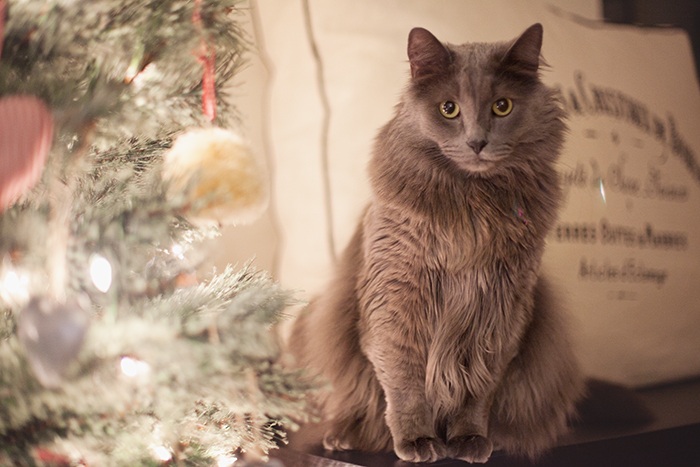The holiday season is a time for decorating our homes with festive plants and greenery. However, it’s important to be aware of which plants may pose a risk to our beloved feline friends. In this article, we will discuss some common holiday plants and their potential toxicity to cats.
Poinsettias + Cats: Actually Okay
One of the most popular holiday plants often considered poisonous is the poinsettia. However, contrary to popular belief, poinsettias are only mildly toxic and do not deserve their bad reputation. Ingesting poinsettias typically leads to no clinical signs or only mild gastrointestinal discomfort. They are generally safe to keep in the home, and pets can even rub against them without significant risk. 
Christmas Trees: Safe but Still Pose Dangers for Cats
Christmas trees are generally safe for pets. However, it’s important to be cautious. The pine needles can cause damage to a cat’s eyes if they run into the tree, resulting in corneal lacerations. Additionally, if pets ingest the sap produced by the tree, mild gastrointestinal discomfort may occur. While natural trees are generally non-toxic for cats and dogs, it’s crucial to monitor your pets’ behavior around the tree to ensure their safety.
Mistletoe is a No For Cats
Mistletoe can be highly poisonous to pets, including cats. Ingesting mistletoe can lead to gastrointestinal upset and, in severe cases, even change mental function, difficulty breathing, or a low heart rate. If your cat ingests mistletoe or shows any of these symptoms, it is imperative to seek immediate veterinary assistance. To keep your pets safe, it’s best to avoid using mistletoe in areas accessible to them. 
Holly is Poisonous to Cats
Another holiday decorative plant, holly, is considered poisonous for both cats and dogs. Ingesting holly can lead to vomiting, diarrhea, decreased energy, and general upset stomach in pets. If you suspect your pet has ingested holly, it’s essential to seek veterinary assistance promptly.
Amaryllis and Daffodils: Toxic For Cats
Amaryllis and daffodils are also toxic for cats. Ingesting these plants can cause vomiting, depression, pain in the abdomen, and a loss of appetite. Tremors may also be observed in severe cases. If your cat consumes any part of these plants, it’s crucial to consult with your veterinarian immediately.
Lilies Are SUPER Toxic For Cats
Lilies are particularly toxic to cats, even in small amounts. Ingesting any part of any type of lily can lead to kidney failure in cats. Clinical signs of lily toxicity may include vomiting, depression, loss of appetite, and ultimately, severe kidney damage. If you suspect your cat has ingested lilies, it is a medical emergency, and you should contact your veterinarian immediately for intense supportive care.
Frequently Asked Questions
Q: Are all holiday plants toxic to cats?
A: No, not all holiday plants are toxic to cats. Poinsettias and Christmas trees are generally safe, but plants like mistletoe, holly, amaryllis, daffodils, and lilies should be considered toxic and kept out of reach of pets.
Q: What should I do if my cat ingests a toxic holiday plant?
A: If your cat ingests a toxic holiday plant or shows any symptoms of poisoning, such as vomiting, diarrhea, or changes in behavior, it is important to contact your veterinarian immediately for guidance.
Q: How can I keep my cat safe during the holiday season?
A: To keep your cat safe during the holiday season, it is best to avoid using toxic plants in areas accessible to your pet. Opt for pet-safe alternatives or display them out of reach. Monitor your cat’s behavior around decorations and plants, and seek veterinary advice if you have any concerns.
Conclusion
While the holiday season is a time for joy and celebration, it’s crucial to be aware of the potential risks that certain holiday plants can pose to our furry friends. Poinsettias and Christmas trees are generally safe, but plants like mistletoe, holly, amaryllis, daffodils, and lilies should be considered toxic to cats. By making informed choices and taking necessary precautions, we can ensure our pets enjoy a safe and happy holiday season. For more pet-related articles and information, visit Pawsoha.